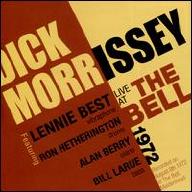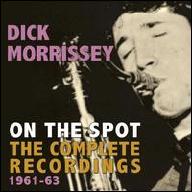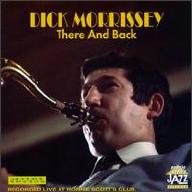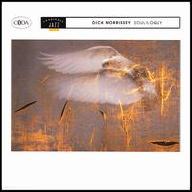With the emergence of free jazz, Morrissey deftly adapted his bold, fluid style to fit more abstract contexts, and in 1969 he founded the pioneering jazz-rock unit If with guitarist Terry Smith. Although inspired by the American acts Blood, Sweat Tears and Chicago, If contrasted sharply with their contemporaries by subtracting brass instruments from the equation, relying on Morrissey's hard-edged saxophones, Smith's trebly guitar, and frontman J.W. Hodgkinson's velvety, elastic vocals. If proved far more successful at home than overseas, even settling in Sweden for some time. After a series of acclaimed LPs, the group dissolved in 1975 and Morrissey teamed with keyboardist Mike Carr, a regular collaborator throughout the years that followed. He next toured the U.S. with Scottish funk expatriates the Average White Band, and while in New York City, collaborated with fellow fusion pioneer Herbie Mann. With his return to Britain, Morrissey teamed with guitarist Mullen for what would prove his most popular and enduring project. Beginning with the 1977 LP Up, cut with the Average White Band, the duo embraced everything from bop to pop to funk and found favor with listeners on both sides of the jazz-rock dyad via acclaimed efforts such as 1979's Cape Wrath.
In all, Morrissey and Mullen co-headlined six albums, with the former often playing soprano saxophone in favor of his traditional tenor. Over time, the duo veered increasingly towards the mainstream, but never earned the American commercial foothold that would have vaulted their career to the next level, and the duo finally split following 1988's Happy Hour. Morrissey then resumed his solo career, additionally building upon a vast and varied session career that extended well beyond jazz to include sessions with Paul McCartney, Peter Gabriel, Gary Numan and Roy Harper. He also appeared on the Vangelis-composed soundtrack to Ridley Scott's groundbreaking sci-fi classic #Blade Runner. Morrissey continued to flirt openly with the pop mainstream on sessions including 1988's Soliloquy, although he remained rooted in traditional jazz as well, with sterling contributions to Carr's 1993 organ-jazz classic Good Times and the Blues. He spent many of his final years in Portugal, remaining an active musician until spinal cancer confined him to a wheelchair. Morrissey nevertheless occasionally sat in with his son Jasper's jazz combo, and in August 2000 reunited with Mullen for a tribute concert at Deal's Astor Theatre. He died November 8, 2000 in Kent. ~ Jason Ankeny, Rovi
















